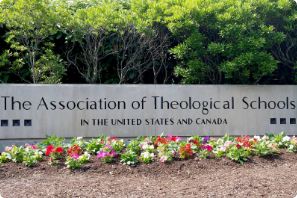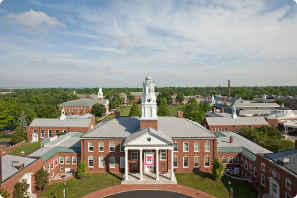The first session of workshops will be held Thursday morning from 10:30 a.m. to 12:00 p.m. A repeat session of the workshops will be held Thursday afternoon from 1:30 to 3:00 p.m.
“Calibrated for a World that No Longer Exists": Creating New Business Models for Theological Education
Scott Cormode, Hugh De Pree Professor of Leadership Development, Fuller Theological Seminary
Theological education, as we know it, is calibrated for a world that no longer exists. We all know we will have to adapt. But how? The purpose of this workshop is to set the parameters for evaluating new business models and to work toward new options for theological education.
CBTE: Three Schools, Three Forms, and Common Outcomes
Stephen R. Graham, Strategic Director of Context and Continuity; Director of Accreditation, The Association of Theological Schools
In response to growing interest in Competency-based Theological Education across the Association, Stephen Graham studied three schools (Lexington Theological Seminary, Sioux Falls Seminary (now Kairos University), and Northwest Seminary), to explore why the schools moved to CBTE, how each implemented forms of CBTE, and the impacts on each school.
Cultivating Educational Capacity for Ministry in a Multiracial Culture: Expanding Conversations, Sharing Strategies, and Learning from Good Practices
Mary H. Young, Director of Leadership Education, The Association of Theological Schools
Jodi L. Porter, Director of Coordination, Forum for Theological Education
This workshop presents findings from schools involved in the ATS Cultivating Educational Capacity (CEC) CORE Project, which focused on educating students to minister in a racially diverse world. Building from the leading edges of scholarship on racial and ethnic diversity in both theological education and higher education, initial findings from these schools will be examined for ways they may inform diversity work at other ATS schools.
Exploring the Pandemic’s Impact on Congregations: What We are Learning about Changes in Participation and the Pastoral Role
Scott Thumma, Professor of Sociology; Director of Hartford Institute for Religion Research, Hartford International University
This workshop will report new findings from three recent surveys (from August 2021, December 2021, and March 2022) of 5,000 churches about how they and their clergy are faring, and about the challenges and possibilities facing faith communities. It will provide an overview of a Lilly Endowment-funded research project led by Hartford Institute for Religion Research to track what the next five years will look like for faith communities, their leaders, and members, with a particular emphasis on changes in attendance, the pastoral role, and the impact on seminaries.
¡Presentes! A Glimpse into the Landscape of Hispanic/Latinx Theological Education
Joanne Solis-Walker, Associate Dean; Professor of Leadership; Candler School of Theology of Emory University
This workshop will present the preliminary findings of a qualitative research study of more than a dozen schools designed to help us map the landscape of Hispanic/Latinx theological education within ATS. We will review the data through a culturally responsive lens to better understand how Hispanic/Latinx serving institutions have been presente and how they contribute to the formation of pastors and ecclesial leaders. We will share some successes and examine the challenges with the intention of capturing the stories of those who have been serving the Hispanic/Latinx ecclesial communities and to the benefit of schools envisioning similar initiatives.
Reason, Emotion, and Power in Change Leadership
Sarah Birmingham Drummond, Founding Dean, Andover Newton Seminary at Yale Divinity School
Both planned and unplanned change results in logistical challenges, outsized emotions, and frustrating confusion in all institutions, from families to nations. Change is also necessary, faithful, and pleasing to a God who wants us to embrace new life. Sarah Drummond explores how leaders can tailor their strategies to their communities’ reactions to change in her 2019 book, Dynamic Discernment: Reason, Emotion, and Power in Change Leadership (The Pilgrim Press). She will share the theoretical framework undergirding Dynamic Discernment, and engage participants in analyzing their own change agendas with its guidance. Drummond will also share some of what she learned while serving as chair of the task force that redeveloped the ATS Standards of Accreditation for the 2020 ATS/COA Biennial Meeting.
Strategic Assessment
Debbie Creamer, Strategic Director of Design, The Association of Theological Schools
We often think about strategic planning, but what would it look like if we gave similar attention to strategic assessment? Using insights from design thinking, this session will explore ways that strategic assessment can help foster an ethos of institutional curiosity by asking what we are doing, why we are doing it, how we could do it better, or even whether we should be doing something at all. The session will also explore how we can lean into our own individual and institutional limits in ways that help us shift from measurement to learning, from solo to team approaches, from fixes to iteration, from small questions to ever bigger ones, and from exhaustion to imagination.
The Changing Landscape of Senior Leadership in ATS Schools
Deborah H. C. Gin, Director of Research and Faculty Development, The Association of Theological Schools
Molly T. Marshall, President, United Theological Seminary of the Twin Cities
Randy MacFarland, Provost/Dean (retired); Professor Emeritus of Pastoral Care and Leadership, Denver Seminary
ATS conducted a series of studies on leadership roles in ATS schools in 2019–2021 to explore the status of the professions and how ATS programs could respond to changing needs. In this workshop, a panel of presenters will unpack the findings from the studies of presidents and deans, including how the role has changed, pathways to the role, the nature and distribution of the work, predicting longevity and satisfaction in the role, degree of institutional support and empowerment, and what work in the role keeps them awake at night. The presentation will be followed by a large group discussion.
The 2020 Standards of Accreditation: Two Years Later
Tom Tanner, Director of Accreditation, The Association of Theological Schools
Affirmed at the 2020 ATS/COA Biennial Meeting by a vote of 198–1, more than 40 schools have been reviewed using the redeveloped ATS Standards of Accreditation. Tom Tanner, the ATS staff member who served as the ATS Commission staff liaison for the redevelopment process, will lead this session highlighting the differences from previous Standards, key areas of emphasis, and some reflections on feedback from these schools.
When Financial Literacy is Not Enough: Addressing Educational Debt among Black Students
Jo Ann Deasy, Director of Institutional Initiatives and Student Research, The Association of Theological Schools
Black students in ATS schools incur significantly higher educational debt than their peers. Why is this the case? This workshop will present key findings from a research project that explored the financial ecologies of Black students and their experiences of navigating theological education, finances, and a call to ministry. Together, we will explore solutions that move beyond the individual to address the systemic financial inequities impacting these students and the congregations they serve.
Study and Resource Group Conversation: Assessment of Prior Learning
With the adoption of the 2020 Standards of Accreditation and the elimination of the 15% rule for students admitted without baccalaureate degrees, several schools are working to develop and implement pathways and tools appropriately to assess the learning that students bring with them to graduate theological studies. The group studying this topic will share learning about processes to ensure “rigorous means” (Standard 7.4) to determine that students are prepared to engage graduate theological studies successfully. A study group representing ATS schools has begun a study of varieties of assessment of prior learning. The group will share initial learnings and solicit input from conversation participants to inform their ongoing study, ultimately leading to interactive online resources for the benefit of the larger membership.
Study and Resource Group Conversation: Student Human Formation
The 2020 Standards of Accreditation require schools give attention to “the intellectual, human, spiritual, and vocational dimensions of student learning and formation . . .” Many schools are well situated to form students intellectually and in the vocational elements of their work. Some are making progress in spiritual formation. Human formation though, remains less fully addressed and there are ongoing questions about what “human” formation means, particularly within different traditions and contexts. A study group representing ATS schools has begun a project to study student human formation. The group will share initial learnings and will solicit input from conversation participants to inform their ongoing study of human formation.
Study and Resource Group Conversation: The Classroom with Multiple Modalities of Teaching and Learning
With the emergency transition to online teaching and learning due to the coronavirus pandemic and the continuing pattern of online, hybrid, and mixed mode programming among schools, many faculty members find themselves teaching in multiple modes simultaneously. A study group representing ATS schools has begun a project to study this phenomenon, attending particularly to issues related to student learning and formation through the hybrid model that involves both online and in-person students in the same classes. The group will share initial learnings and will solicit input from conversation participants to inform their ongoing study of this form of hybrid teaching and learning.



